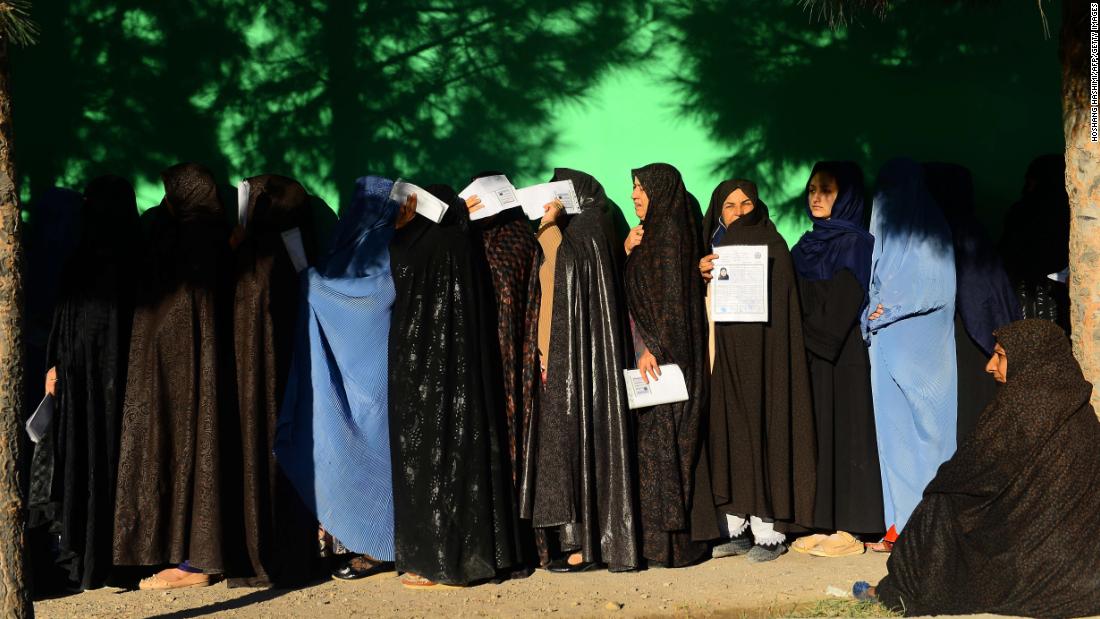
The Afghan government and the Taliban are currently meeting for the first time since a United States-Taliban deal in February promised intra-Afghan negotiations and a gradual withdrawal of US forces. Many criticize the US government for failing to secure more from the Taliban in its initial deal -- including any guarantees for Afghan women, despite years of bipartisan promises to protect Afghan women's rights.
With this omission, negotiations on women's rights now fall among a host of other complicated issues -- including a ceasefire, the structure of a power-sharing government, the reintegration of Taliban fighters -- that will test the Afghan government's resolve and the Taliban's unity. And many Afghan women fear that in this mix of contentious priorities, their rights could be traded for a chance at ending the conflict.
But a peace agreement that sells out half the population would be a counterproductive choice. A plethora of research shows that women's participation improves the likelihood of reaching a lasting peace agreement; their contributions strengthen post-conflict recovery and their political participation is associated with a lower risk of civil war and of conflict relapse. Conversely, research has also shown that gender inequality increases the risk of terrorism and instability. One study found, for example, that less empowerment for women at the household level (such as in property and inheritance rights; rights in marriage, divorce, and custody; and the level of violence against women in the home) correlates with less stability nationwide -- including more political instability, corruption, and internal conflict.
These findings are directly relevant to the Afghan context, where decisions on the future of women's rights and opportunities will have ripple effects across society.
Inspired by this evidence and by Afghan women's calls for support, over 100 global leaders released a letter urging the Afghan government to forge a durable peace by ensuring Afghan women's meaningful participation throughout the peace process, preserving the Afghan constitution's protections for gender equality, and establishing mechanisms to monitor women's rights and liberties.
Indeed, Afghan women and girls have made immense progress since the fall of the Taliban.
Under Taliban rule from 1996 to 2001, Afghan women were banned from schools and work, faced public beatings and executions, and endured severe restrictions on their movement. Today, by contrast, girls represent nearly 40% of children enrolled in school, and women are active in political and economic life -- serving as mayors, entrepreneurs, police officers, and doctors, and representing 27% of parliament (a higher proportion than US congresswomen).
And yet, as they seize these opportunities to contribute to Afghan society, women and girls face targeted violence and harassment, from Kabul to the provinces to Taliban-controlled areas.
Feeling their gains to be tenuous and with much to lose, Afghan women find little reassurance in the Taliban's recent promise to respect "the rights of women that are granted by Islam," without specifics on what this would mean. As the Afghan Women's Network recently reflected, the peace process not only addresses historical grievances but threatens to produce future injustice. With such high stakes, Afghan women have mobilized across civil society and government to ensure their perspectives are reflected in any deal shaping the country's -- and their—future. They have demanded seats at the negotiation table and have laid out their priorities for the peace process, including in an open letter to the Taliban from nearly 400 Afghan women leaders and activists.
In the current talks, five women serve on the government's 21-member team, with none on the Taliban's team. (As such, women total less than 10% of the negotiators involved). Afghan women had hoped for more opportunity to influence the peace dialogue, but the presence of any women at the table marks progress: In 67 rounds of talks between 2005 and 2020 (including formal and informal negotiations, exploratory meetings, and internationally backed consultations), women participated on only 15 occasions (22%), according to research by Oxfam. And they have done so at significant cost, facing targeted violence intended to drive them out of politics. One woman negotiator -- Fawzia Koofi, a former member of Parliament -- comes to the current talks with visible injuries from a recent assassination attempt by unknown gunmen.
Not only does women's participation in the Afghan peace process make a lasting peace deal more likely, once the agreement is reached, Afghan women will be critical allies in implementing it and ensuring its sustainability. Despite the many barriers to their participation, Afghan women have made valuable contributions to prevent violence and build peace through their roles as public officials, security officers, and community leaders. They have successfully negotiated with insurgent leaders and supported the reintegration of demobilized Taliban fighters into local communities. They have countered extremist narratives targeting children; mobilized public awareness of and local support for the peace process; and worked across cultural and sectarian divides to push for the social and economic priorities that will help Afghanistan to reconcile and recover.
With the rights of half of Afghanistan's population under threat, global leaders -- including former presidents and prime ministers, as well as four former US secretaries of state (Colin Powell, Condoleezza Rice, Madeleine Albright, and Hillary Clinton) -- recommended that donors of international aid condition their financial help on the country's protection of women's rights. It is a bold, data-informed policy intended to facilitate Afghanistan's recovery: Research shows that when women are empowered, countries are more prosperous and stable; and when women's rights are denied, countries experience greater instability, corruption, and conflict.
As talks proceed, the meaningful inclusion of Afghan women and a steadfast commitment to their rights will remain critical. If Afghan women lose out in a peace deal, so too will the entire country.
"center" - Google News
October 05, 2020 at 09:38PM
https://ift.tt/2Sq1zcl
Women should be at the center of Afghan peace talks - CNN
"center" - Google News
https://ift.tt/3bUHym8
https://ift.tt/2zR6ugj
Bagikan Berita Ini














0 Response to "Women should be at the center of Afghan peace talks - CNN"
Post a Comment